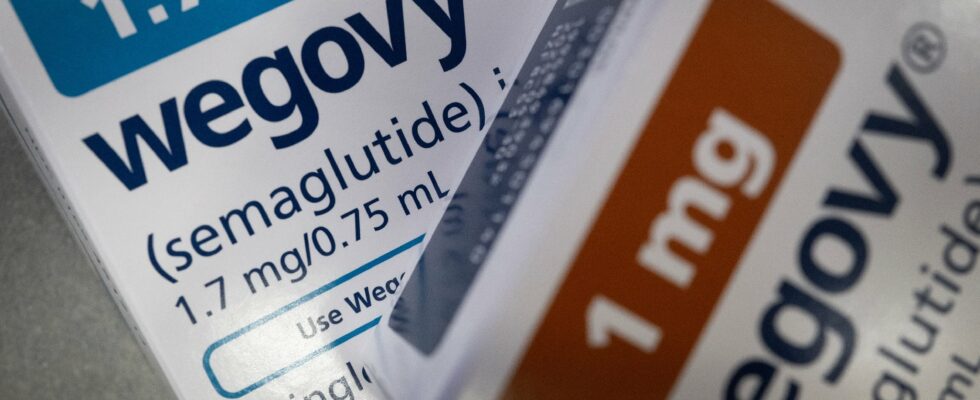Patients have been waiting for this for a long time. Wegovy, the obesity treatment from Danish company Novo Nordisk, has just been launched on the French market. Authorized in the European Union since January 2022, it presents impressive results, with weight losses of around 15% on average. Until now, only a little less than 10,000 French people had access to it free of charge, as part of an exceptional system. From now on, it will be accessible to all patients, provided that they meet the criteria defined by the health authorities: under 65 years old, body mass index (BMI) greater than or equal to 35 (i.e. for example 110 kilos for 1 .75 meter), prescription by a specialist doctor. And on condition, above all, that they finance their treatment themselves.
An astonishing strategy, and which will not fail to arouse criticism, when obesity mainly affects the most precarious populations. The price of the drug in France is now known, and it turns out to be very expensive: between 9 and 12 euros per day, depending on the margins applied by wholesalers and pharmacists, or between 274 and 365 euros per month. Less than in the United States (around 1300 euros per month), but very far from the reach of all budgets.
Officially, it is a question of the laboratory responding to high demand, while waiting for reimbursement to be granted. Until now faced with production problems which blocked its launch in any case, it assures that it is now able to supply the French market up to the needs. The manufacturer also waited until it was able to meet the demand for its other flagship product, Ozempic, composed of the same molecule but in a lower dosage, against diabetes, before launching Wegovy.
Reimbursement possible since 2022
The absence of coverage by Social Security would be due to administrative delays beyond its control. The reality is of course a little more complex. Because Novo Nordisk obtained a favorable opinion for its reimbursement from the High Health Authority in 2022. But at the time, and taking into account the studies then available, it indicated that the product did not provide “any improvement in the actual medical benefit”. A bad rating which placed the company in a delicate position to then negotiate the price of its product with the State, via the Economic Committee for Health Products (CEPS). Novo Nordisk therefore preferred to postpone this discussion until better days.
In May, the laboratory submitted new data to the High Health Authority, which must examine them in the coming weeks. These additional studies demonstrating a cardiovascular benefit beyond just weight loss, it is a safe bet that the new opinion will allow the company to obtain a price that better corresponds to its expectations. However, the entire process is not expected to be completed before the beginning of next year.
In the meantime, launching into the market without reimbursement has several advantages for the laboratory. First, it quickly became obvious to its leaders that a part of the population – not necessarily those who need it most – is “ready to pay out of their own pocket”, as Lars Fruergaard Jorgensen recognized, the CEO of Novo Nordisk, in the Financial Timesearly 2024. Under these conditions, why deprive yourself of this potential market?
Competition lurks
The Danish laboratory is also driven by competition: the American Eli Lilly has a similar drug which studies show is even more effective. Novo Nordisk therefore has every interest in earning revenue as long as it is alone in the running. Conquering market share as quickly as possible should also help it secure its positions in the future, as some of the patients already attracted may hesitate to change treatment.
Entering the market without reimbursement also allows the laboratory to set its own price, which, in this case, is not subject to regulation. Only the patient-clients’ willingness to pay counts. By choosing its price, the laboratory also sends a signal to the authorities: it is a basis for discussion which the CEPS will find itself in one way or another obliged to take into account in future negotiations. And this, even if the production costs of the drug seem incommensurable according to a study published in the Journal of the American Medical Association (JAMA), which reported a very wide range, with a maximum of 75 dollars per month (68 euros). And even if, also, the prices set by our neighbors are much lower than those currently demanded of the French: 140 dollars per month in Germany and 92 in the United Kingdom. It will nevertheless be difficult for State representatives to free themselves from the pressure of patients, who are very waiting for treatment, and therefore very demanding that the discussions be concluded as quickly as possible.
With Wegovy, it is already certain that not all patients will benefit from reimbursement. This will in fact be conditional on a body mass index to be determined, but certainly quite restrictive. This will be another issue in future discussions. But if the current situation is not unfavorable for the laboratory, it also suits the public authorities. As the bill for Social Security promises to be very heavy, there is no doubt that the health authorities would prefer to see it arrive as late as possible, for the smallest possible population, and at the lowest possible price. In the meantime, patients will pay.
.
